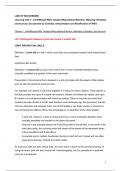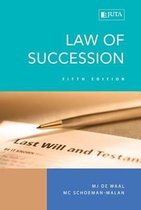LAW OF SUCCESSION
Learning Unit 5 : Joint/Mutual Wills, Adiation/Repudiation/Election, Massing of Estates
and Accrual, Succession by Contract; Interpretation and Rectification of Wills
Theme 1: Joint/Mutual Wills, Adiation/Repudiation/Election, Massing of Estates, and Accrual
LO1: Distinguish between a joint will versus a mutual will;
JOINT AND MUTUAL WILLS
Definition: A joint will is a will in which more than one competent testator have made known
their
respective last wishes.
Definition: A mutual will is a joint will in which two or more competent testators have
mutually benefited one another in the same document
Presumption: We presume that a bequest in a will only deals with the assets of the testator
and not also the assets of someone else.
For example, two sisters A and B live together in a home for senior citizens. They execute a
will that provides that upon A’s death her brother’s children will inherit her assets, and upon
B’s death a church denomination will inherit her assets. There is only one document that
contains the wills of both A and B. both testators must obviously sign the document, but still
only two witnesses are required. Each one of the testators can freely revoke or amend her
own will during her lifetime without the knowledge or co-operation of the other testator.
- A joint will, however, is also a mutual will if two or more competent testators have
mutually benefited one another in the same document.
- Assume in the example above that A and B provide in the will that, in the event of the
one sister dying, the surviving sister will inherit all the assets of the deceased sister:
A thus benefits B and B benefits A.
- In practice and in modern handbooks the terms ‘joint will’ and ‘mutual will’ are often
used synonymously. Corbett and others state:
As most joint wills are also mutual wills, not much harm is done by the common practice of
using the terms ‘joint will’ and ‘mutual will’ interchangeably, but it is possible for a joint will
not to be a mutual will.
1
,Presumed as a point of departure that a bequest in a will has a bearing only on the assets of
the testator and not also on the assets of anyone else:
- Applies to joint and mutual wills
- Thus in such a will a bequest of ‘our’ assets
- For example, is not necessarily sufficient proof that the first-dying intended to
bequeath his/her assets as well as the assets of the survivor.
- This is why, in the case of reasonable doubt about whether massing of estates was
envisaged in a will or not, the presumption is against massing of estates.
- That is to say, there is a presumption that the testator disposed of only his/her own
assets.
LO2: Discuss the legal consequences of adiation and repudiation;
ADIATION OR REPUDIATION (ELECTION)
It is the executor’s task to administer the estate by settling estate debts and dividing the
remaining assets among the beneficiaries. In order to do this, the executor must know
whether the beneficiaries accept their benefits or not. When an estate ‘falls open’, a
beneficiary has the choice of accepting the succession benefit (to adiate) or renouncing it (to
repudiate).
- Adiation thus means that the beneficiary accepts the benefit and repudiation means
that the beneficiary renounces the benefit.
Nobody can be forced to accept a benefit from a deceased. But one cannot adiate or
repudiate a benefit partially or conditionally and a person is expected to adiate or repudiate
within a reasonable time.
In Kellerman v Van Vuren a beneficiary repudiated succession benefits shortly before the
sequestration of his estate. The trustee of the insolvent estate argued that this repudiation
amounted to a ‘disposition without value’ in terms of section 26 of the Insolvency Act 24 of
1936.
But the court rejected this argument and found in effect that the beneficiary can repudiate
and cannot be obliged to adiate. This view was confirmed by the Supreme Court of Appeal in
Wessels v De Jager.
2
,It is customary to accept that the beneficiary has adiated the bequeathed benefit:
- Unless a beneficiary thus repudiates, it is accepted in practice that he or she has
adiated.
- The reason for this approach is that as a rule a beneficiary can only benefit by
adiating a succession benefit.
- But it is possible that a burden or obligation can be placed on a beneficiary along with
the benefit.
- In such a case to the beneficiary is not obliged to adiate, but if he/she adiates, it must
be with the concomitant burden.
- The beneficiary thus still has a choice.
Corbett and others explain the position as follows:
• By adiating, a beneficiary may make a choice between two different sets of benefits:
to assume, together with the benefits bestowed, a burden or encumbrance, or to
surrender a right or power in exchange for a benefit...And even where a beneficiary
can adiate without having to pay a price, as in the position in the vast majority of
cases, that beneficiary may, for a variety of reasons, prefer to repudiate, if only in
order that the estate devolves directly upon the person next in line of succession.
Written adiation is usually not required, but in cases where the testator has placed an
obligation on the beneficiary or where the testator has disposed of the beneficiary’s assets,
written adiation will be required. Written repudiation is also required where no such
obligation has been placed on the beneficiary.
Effect of adiation and repudiation:
The effect of adiation is that the beneficiary acquires a vested personal right against the
executor of the estate to deliver the bequeathed benefit to him/her, or to register it in his/her
name.
The effect of repudiation by a testamentary beneficiary depends on the provisions of the will
and the particular circumstances.
If the will makes provisions for substitution, effect has to be given to this. Statutory accrual or
substitution (representation) may also occur.
3
, The repudiated benefit may also
- accrue to the other testate heirs in terms of the appropriate rules;
- it is possible that the repudiated benefit falls into the residue of the estate;
- and it is possible that it must devolve intestate.
If the beneficiary has exercised his/her choice to adiate or to repudiate, this is final. In certain
exceptional cases a beneficiary may, however, be allowed to withdraw his/her adiation or
repudiation.
Choice or election:
(Doctrine of election) If the beneficiary received a benefit with an accompanying burden or
obligation, he must accept or repudiate the benefit and the accompanying obligation. The
beneficiary’s choice is known as election.
As indicated, a person sometimes has a choice of adiating or repudiating a benefit with an
accompanying burden or obligation.
If the beneficiary receives a benefit with an accompanying burden or obligation, he/she must
adiate/repudiate the benefit with the accompanying obligation.
Unless the will provides otherwise, the beneficiary thus cannot adiate the benefit, but
repudiate the burden or obligation. The beneficiary’s choice in this regard is known as
election.
Van der Merwe and Rowland explain election as follows:
• Reference is usually made to election or choice in cases where the will placed an
obligation upon the beneficiary.
• A provision in a will that is unacceptable or unattractive to the beneficiary who is
placed before a choice, can have various forms.
• It may compromise a bequest of property that, to the knowledge of the testator,
belonged to the beneficiary.
• On the other hand, it may be a provision in terms of which the beneficiary has to do,
or refrain from doing, something towards which he feels disinclined, for example to
complete a book that the testator or someone else already started writing, or to pay a
beneficiary who is mentioned in the will a certain amount of money.
4





